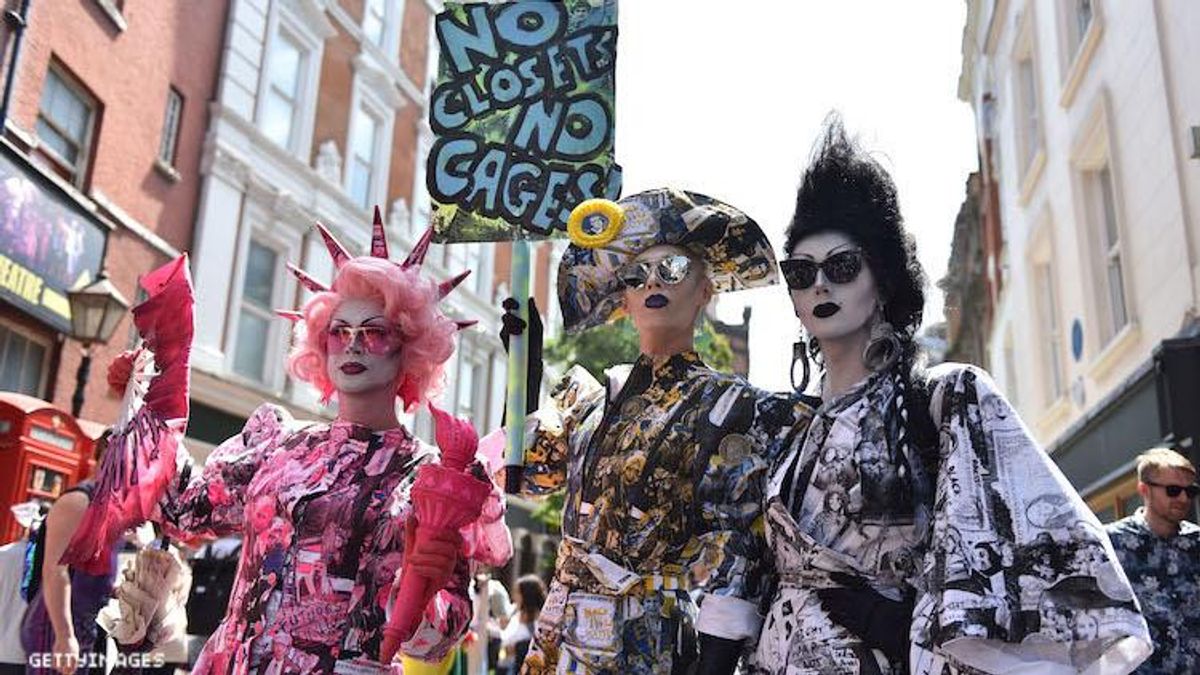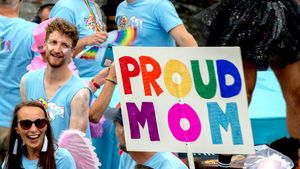All Rights reserved
By continuing to use our site, you agree to our Private Policy and Terms of Use.
In a cultural moment where RuPaul's Drag Race is bringing unprecedented attention--and revenue -- to drag, there remains an open question in the nightlife scene: How can the spoils of the drag boom be shared equitably among performers, even those who don't have millions of followers on Instagram and lucrative Netflix deals?
The reality is that while Drag Race winners like Trixie Mattel and Bianca Del Rio are booking sold-out shows across the country, drag remains a labor of love for many performers who may struggle to get paid on time, if at all. In a 2018 deep dive into the economics of the industry, The Stranger reported that the vast majority of performers are booked through Facebook and Twitter direct messages, usually without a written contract. Because the deal isn't binding, clubs and promoters can cancel a performer's slot at any time for any reason. In fact, a drag performer might show up to a gig just to find out they've been bumped.
That's why San Francisco-based drag artist Alexis Atauri started Werk Is Work, a first-of-its-kind campaign earlier this year to ensure fair treatment for performers in the Bay Area. In June, more than 2,000 people signed a petition calling on local bars and nightclubs to pay performers a guaranteed booking fee per show: $40, which equates to a maximum of two numbers at the venue and two hours of work in total. If individuals perform additional songs or work overtime, either the club or the third-party promoter booking the event would be required to pay them more.
Trending stories
The mission is to get bars and clubs to sign onto the campaign by certifying that they adhere to those standards. Participating spaces will be demarcated with a sticker in their front windows--a black circle bearing the campaign's name.
According to Atauri, the reaction to Werk Is Work within San Francisco's drag community has been "very mixed." "I've had a lot of people who say we should be getting paid $100 minimum," she shares, "while others are worried about how it might affect the status quo, the existing system that people have fought so hard to build."
Among the more vocal concerns, established performers who are already earning $200 or $300 per appearance are afraid the petition will affect their rates. If clubs agree to those standards, some have asked Atauri, will they then have to accept a $40 fee as well?
But Atauri clarifies that the $40 isn't a blanket requirement for all drag artists who perform at every single club. Instead it's a starting point for first-time performers who may not know how to advocate for themselves or even what to ask for. According to the New York Times, Horrorchata, one of the founders of the Brooklyn drag festival Bushwig, performed for free for two years before she ever saw a dime from it.
Atauri began doing drag three years ago as a means to tell a story--by creating a character and then bringing her to life on stage. One of her signature performances, for instance, involves devouring a container of McDonald's chicken nuggets while she sings about self-pity.
As she worked to find her voice and perspective, Atauri says she had a "really, really great experience starting drag in the city," but she knows that isn't universal.
"My first gig ever someone paid me $60 plus tips, but I saw people trying to start new shows and operating in the red to make it happen," she says. "Some amazing artists around me were not really being compensated for their time. And I thought to myself: There's so much money in San Francisco. How can we not garner a little bit more of that for ourselves if we're going out and creating business opportunity for these bars?'"
Many performers say they've had positive experiences with bars and nightclub promoters overall, their paychecks often don't reflect the behind-the-scenes work that goes into putting on a show. VivvyAnne ForeverMore, who is also based in San Francisco but is not affiliated with Werk Is Work, says she starts getting ready at 3 p.m. for a show she hosts on Friday nights. While the show doesn't start until 7, it takes her that long to do hair and makeup, prepare for her performance, and set up the space.
"I'm not paid for those four hours," she says. "I'm paid to be there when I'm there, but I'm not paid for the prep work I have to do in order to do my job."
Pickle, a drag queen based in Los Angeles, further points to the "percentage deal" as an indication of the unfair labor practices to which performers are often subjected. Performers are often given a certain percentage--say, 10 percent--of the evening's drink sales in exchange for getting people to the club. The unspoken assumption, she says, is that drag artists will do their own promotion on social media. In addition to time spent memorizing choreography or learning the words to songs they're lip-syncing, that could be an additional 10 hours of work.
"Bars and clubs, a lot of them, have created this idea that as a drag queen, your job is to make the night happen," Pickle says. "So if they have a percentage deal, it makes so much sense for them because they don't lose anything. If they don't do any work to get any people in the bar, it's very low risk to them, but it's very high risk to you."
Werk Is Work is intended as a "first step" toward having an honest dialogue about such practices in the nightclub industry, Atauri says, as well as encouraging greater organizing around fair wages. "Equity is not pie," she says. "More for everybody else is not less for you."
But Atauri, as well as every performer interviewed for this story, expressed skepticism that a formalized drag union -- one akin to the Screen Actors Guild -- would offer a solution to the industry's pay problem. The organization was established in 1933 to prevent actors from being exploited and forced to work extremely grueling schedules (in 2012 it merged with the American Federation of Television and Radio Artists to become SAG-AFTRA).
While drag is still catching up with that decades-old conversation, performers said a union would have to encompass an enormous scope to capture all the different work performers are asked to do--which could arguably differentiate it from, say, professional unions like ones for teachers or nurses. For instance, Pickle recalled that she's been hired for "really unusual" gigs during her career -- like popping out of a cake and singing "Sweet Home Alabama." She even performed at a funeral once.
Pickle said the idea of a drag union, thus, raises more questions than answers. "Is it just bars and clubs?" she asked. "Is it all gigs? If you're a musician and you appear on screen, you have to join SAG because you're technically playing a musician. How does that apply to drag? If you're not performing, do you fall in a different scale or are you doing a different thing?"
Atauri adds that the drag scene is "its own special beast," one where there are "no rules onstage or offstage." This is particularly true of San Francisco, where she says many of the most transformative spaces to perform drag don't turn
a profit; they're places where performers can get "weird," not necessarily where anyone is interested in making money. "A union might be at odds with spaces like that," Atuari says, "and that's not really what I want to do."
That's why Atauri, who says she is pro union, hopes that establishing a minimum pay rate and asking clubs to sign onto it might offer a happy medium between full union representation and having no safeguards at all. In December, she delivered a certification to the first venue in San Francisco that agreed to come on board: Ginger's in the Financial District. Given that most bars and clubs in the Bay Area already pay drag performers at least $40 per performance, she is confident that more spaces will join the campaign in 2020.
Whether other cities across the United States, which have their own unique drag cultures and labor issues, will follow suit remains to be seen. As of now, Werk Is Werk is paving the way for a more equitable professional drag experience.
Atauri says her end goal isn't just to ensure that her fellow performers are being paid fairly and on time. It's also about respect.
"Drag is art, and it should be revered as such," she says. "Just like when you go to a gallery and there's a lot of expensive paintings on the wall, you go to a club and there's these beautiful live paintings in front of you. It's not so much about, 'Wow, that's a lot of work. You should be compensated for it.' It's really looking at the value that it brings to the spaces that we're in."
This piece originally appears in Out's Culture Issue, available on newsstands on 2/25. To get an advanced look at the issue, download it for Kindle or Nook, and grab your copy by subscribing now.

























































































